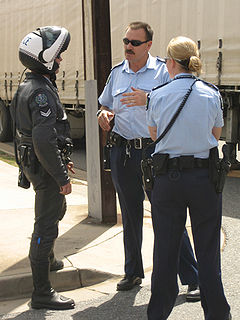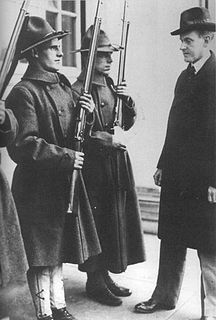Related Research Articles

Strike action, also called labor strike, labour strike, or simply strike, is a work stoppage, caused by the mass refusal of employees to work. A strike usually takes place in response to employee grievances. Strikes became common during the Industrial Revolution, when mass labor became important in factories and mines. In most countries, strike actions were quickly made illegal, as factory owners had far more power than workers. Most Western countries partially legalized striking in the late 19th or early 20th centuries.

A police officer, also known as an officer, policeman, or a policewoman is a warranted law employee of a police force. In most countries, "police officer" is a generic term not specifying a particular rank. In some, the use of the rank "officer" is legally reserved for military personnel.

The Fraternal Order of Police (FOP) is a fraternal organization consisting of sworn law enforcement officers in the United States. It reports a membership of over 330,000 members organized in 2,200 local chapters (lodges), state lodges, and the national Grand Lodge. The organization attempts to improve the working conditions of law enforcement officers and the safety of those they serve through education, legislation, information, community involvement, and employee representation.

Joseph Lawrence Alioto was the 36th mayor of San Francisco, California, from 1968 to 1976.

Victoria Police is the primary law enforcement agency of Victoria, Australia. It was formed in 1853 and now operates under the Victoria Police Act 2013

In the Boston Police Strike, Boston police officers went on strike on September 9, 1919. They sought recognition for their trade union and improvements in wages and working conditions. Police Commissioner Edwin Upton Curtis denied that police officers had any right to form a union, much less one affiliated with a larger organization like the American Federation of Labor (AFL). Attempts at reconciliation between the Commissioner and the police officers, particularly on the part of Boston's Mayor Andrew James Peters, failed.

The Baltimore Police Strike was a 1974 labor action conducted by officers of the Baltimore Police Department. Striking officers sought better wages and changes to BPD policy. They also expressed solidarity with Baltimore municipal workers, who were in the midst of an escalating strike action that began on July 1. On July 7, police launched a campaign of intentional misbehavior and silliness; on July 11 they began a formal strike. The department reported an increase in fires and looting, and the understaffed BPD soon received support from Maryland State Police. The action ended on July 15, when union officials negotiated an end to both strikes. The city promised police officers a wage increase in 1975, but refused amnesty for the strikers. Police Commissioner Donald Pomerleau revoked the union's collective bargaining rights, fired its organizers, and pointedly harassed its members.

The San Francisco Police Department (SFPD) is the city police department of the City and County of San Francisco, California. The department's motto is the same as that of the city and county: Oro en paz, fierro en guerra, Spanish for Gold in peace, iron in war.
The Public Employees Fair Employment Act, more commonly known as the Taylor Law, is Article 14 of the New York State Civil Service Law, which defines the rights and limitations of unions for public employees in New York.

The 2005 New York City transit strike, held from December 20 through 22, 2005, was the third strike ever by the Transport Workers Union Local 100 against New York City's Transit Authority and involved between 32,000 and 34,000 strikers.
Police misconduct refers to inappropriate conduct and/or illegal actions taken by police officers in connection with their official duties. Types of misconduct include: coerced false confession, intimidation, false arrest, false imprisonment, falsification of evidence, spoliation of evidence, police perjury, witness tampering, police brutality, police corruption, racial profiling, unwarranted surveillance, unwarranted searches, and unwarranted seizure of property. Other types of misconduct include:

The Police Benevolent Association of the City of New York (PBA) is the largest police union representing police officers of the New York City Police Department. It represents about 24,000 of the department's 36,000 officers.
A blue flu is a type of strike action undertaken by police officers in which a large number simultaneously use sick leave. A blue flu is a preferred strike action by police in some parts of the United States where police strikes are prohibited by law.
The San Francisco Police Department began operations on August 13, 1849 during the Gold Rush under the command of Captain Malachi Fallon. At the time, Chief Fallon had a force of one deputy captain, three sergeants and thirty officers.
A police strike is a potential tactic when law enforcement workers are embroiled in a labour dispute. Sometimes military personnel are called in to keep order or discipline the strikers. Police strikes have the potential to cause civil unrest.

The Indianapolis streetcar strike of 1913 and the subsequent police mutiny and riots was a breakdown in public order in Indianapolis, Indiana. The events began as a workers strike by the union employees of the Indianapolis Traction & Terminal Company and their allies on Halloween night, October 31, 1913. The company was responsible for public transportation in Indianapolis, the capital city and transportation hub of the U.S. state of Indiana. The unionization effort was being organized by the Amalgamated Street Railway Employees of America who had successfully enforced strikes in other major United States cities. Company management suppressed the initial attempt by some of its employees to unionize and rejected an offer of mediation by the United States Department of Labor, which led to a rapid rise in tensions, and ultimately the strike. Government response to the strike was politically charged, as the strike began during the week leading up to public elections. The strike effectively shut down mass transit in the city and caused severe interruptions of statewide rail transportation and the 1913 city elections.
Eric Joseph Schmertz was an American lawyer who specialized in labor negotiation, helping reach agreements between workers and management in many strikes and other threatened union actions in New York City, including actions by the city's taxi drivers and other municipal workers, as well as helping resolve other negotiations elsewhere in the United States. A law professor for many years, he also served as dean of Hofstra University School of Law.
The 1974 Baltimore municipal strike was a strike action undertaken by different groups of municipal workers. It was initiated by waste collectors seeking higher wages and better conditions. They were joined by sewer workers, zookeepers, prison guards, highway workers, recreation & parks workers, animal control workers, abandoned vehicles workers, and eventually by police officers. Trash piled up during the strike, and, especially with diminished police enforcement, many trash piles were set on fire. City jails were also a major site for unrest.
A police union is a trade union for police officers.
The 2020 Atlanta Police Strike is a police strike in Atlanta, Georgia, United States.
References
- ↑ Sestanovich, Clare. "A Short History of Police Protest". The Marshall Project. Retrieved 16 November 2016.
- 1 2 Reuss, Edward. "The Police Strike". nycop.com. Retrieved 16 November 2016.
- 1 2 Maeder, Jay. "BLUE FLU Cops on strike, December 1970 - January 1971 CHAPTER 384". NY Daily News. Retrieved 16 November 2016.
- ↑ "Definition of blue flu". Merriam-Webster. Retrieved 16 November 2016.
- ↑ "New York State Public Employees Fair Employment Act — The Taylor Law". New York State Governor's Office of Employee Relations. Archived from the original on 15 April 2013. Retrieved 16 November 2016.